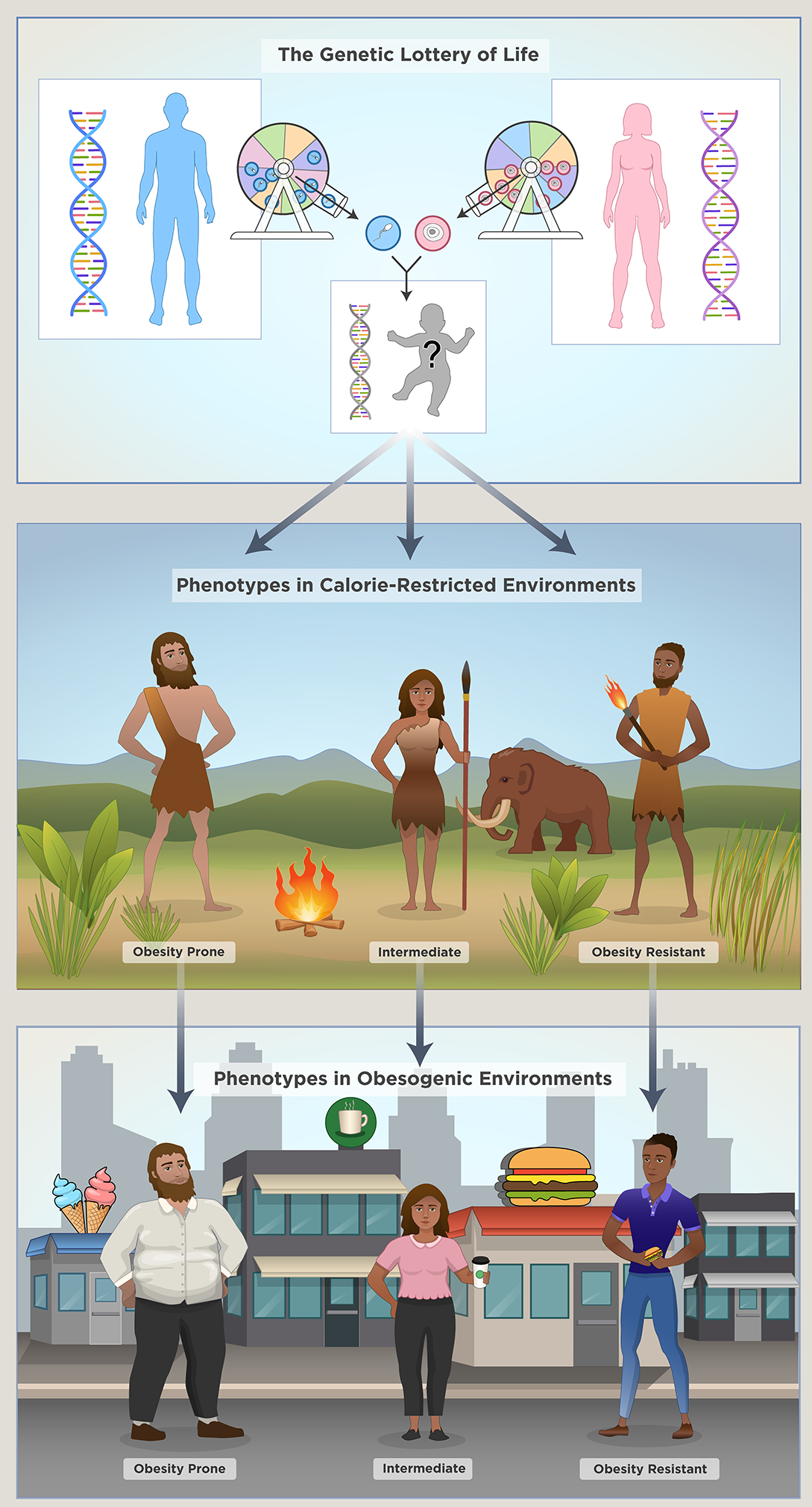
The Genes to Stay Lean in a Fat World

From Lund et al: https://doi.org/10.1371/journal.pbio.3000629
We are swimming in a sea of implicit weight bias. At its most basic, the bias is this: obesity is a behavioral problem. When we tell people, no, it’s a problem of physiology, most often they can’t accept it. Tell them it’s highly heritable and they often spit back at us. “Genes are not destiny!” (Sigh.) But scientific facts are stubborn. A thoughtful new paper in PLOS Biology by Jens Lund et al does a fine job of assembling some very relevant facts. It’s all about the genes to stay lean in a fat world.
These genes confer a still-mysterious hormonal mechanism to keep a body lean in an environment that promotes obesity.
Following a Trail Across Six Decades
In an elegant twitorial, Christoffer Clemmensen traces six decades of research that points to a hormonal factor that gives an individual resistance to obesity.
It started in 1959 with a paper by G.R. Hervey. He studied rats whose circulatory systems were joined in an experimental technique called parabiosis. When the hypothalamus of one of the rats was damaged to cause obesity, the connected rat became thinner as the rat with obesity grew fatter.
This finding suggested some unidentified hormone secreted by the rat with obesity. The damaged hypothalamus did not respond to that signal. The paired rat did and it grew thinner to the point of death.
These are fascinating experiments that link up with research findings today.
An Elusive Pathway
This elusive mechanism might explain why about 25 percent of the population in the U.S. seems to be resistant to obesity. Perhaps that satiety signal kicks in at a relatively low weight and prevents further weight gain. These people hit a physiological BMI ceiling that their bodies don’t want to cross. Lund et al see exciting possibilities, concluding:
With the newest technological advances, including omics-methods, the time is ripe for pursuing unknown circulating factors and for delineating their mechanisms of action. The future is now, and the unidentified factor of overfeeding, if this signal exists, is there to be discovered. Decoding the physiology that counteracts weight gain is arguably one of the most critical tasks for modern metabolic research, and we hereby encourage our colleagues to join this 60-year-old quest.
Indeed, they have activated our curiosity.
Click here for the paper by Lund et al and here to read more about the genes to stay lean in a fat environment.
Jeans for Genes, photograph © susan / flickr
Subscribe by email to follow the accumulating evidence and observations that shape our view of health, obesity, and policy.
February 27, 2020

February 27, 2020 at 10:39 am, Allen Browne said:
Yup – as my friend Amy Phipps told me years ago “We are studying the wrong ones. We should study the non-obese people”
Allen
February 27, 2020 at 12:33 pm, John DiTraglia said:
the proverbial magic bullet! everything is so complicated until it’s not.
February 27, 2020 at 8:25 pm, Debra Taylor said:
Disagree.
They may be pre-disposition for weight gain but not destined by genes. Excess eating is a readily available and legal substance that is used as a coping mechanism for issues, problems or unhealed experiences that have been left untreated. #FoodAddiction
February 28, 2020 at 4:13 am, Ted said:
Genes are not destiny. They’re an inconvenient fact of life. As it is for the short kid who does his best in basketball, so it is for the young person whose body is programmed to store a lot of fat. There’s one difference, though. The genes that make a body store a lot of visceral fat bring a risk for diabetes, heart disease, cancer, liver disease, and much more. So dealing with this chronic disease as you would any other disease is important.
Finally, while it is true that some people turn to drugs, alcohol, or food in response to traumatic stress, that does not make addiction the primary problem. It’s a complication of traumatic stress.
February 29, 2020 at 8:55 am, David Brown said:
The mechanisms for these associations remain speculative? I don’t think so. In a 2011 Review entitled “Animal products, diseases and drugs: a plea for better integration between agricultural sciences, human nutrition and human pharmacology” the authors wrote, “Even though the underlying biochemical mechanisms have been thoroughly studied for more than 30 years, neither the agricultural sector nor medical practitioners have shown much interest in making practical use of the abundant high-quality research data now available.” https://lipidworld.biomedcentral.com/articles/10.1186/1476-511X-10-16
February 29, 2020 at 10:05 am, Ted said:
Keeping track of speculation, beliefs, and firmly established facts is hard, but it’s very important. As you’ve pointed out many times, David, people can easily confuse these things.
February 29, 2020 at 7:42 pm, Alyson Shirer said:
I respectfully disagree. The body doesn’t store a lot of fat if you don’t overeat. We say choices are not the problem, but what do the national guidelines and medical associations recommend for treatment? Reducing calories. Eating less. The metabolic issues kick in when the excess fat, inflammation, etc. promote metabolic changes.
March 01, 2020 at 4:46 am, Ted said:
Unfortunately, Alyson, you are only partly correct. Behavioral changes are a help, but not a cure for the physiological problem of obesity. People can typically lose about 5-10 percent of their weight through such efforts. With a great deal of effort, they can maintain most of that loss. But even with improved health and a lower weight, excess adiposity remains a problem. Some bodies do store a lot of fat. Perhaps yours does not. If so, you are fortunate. But not everyone shares the same physiology.